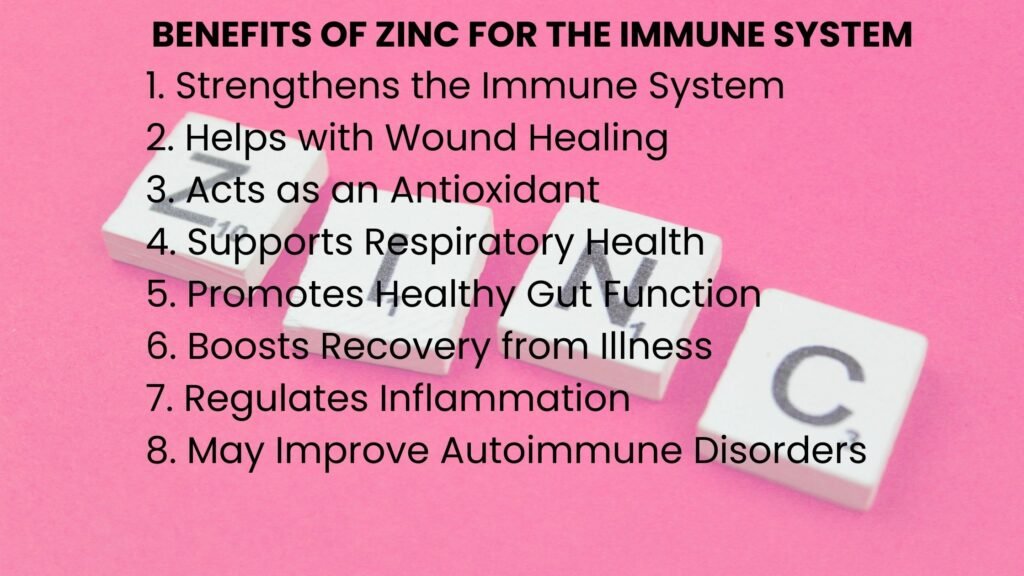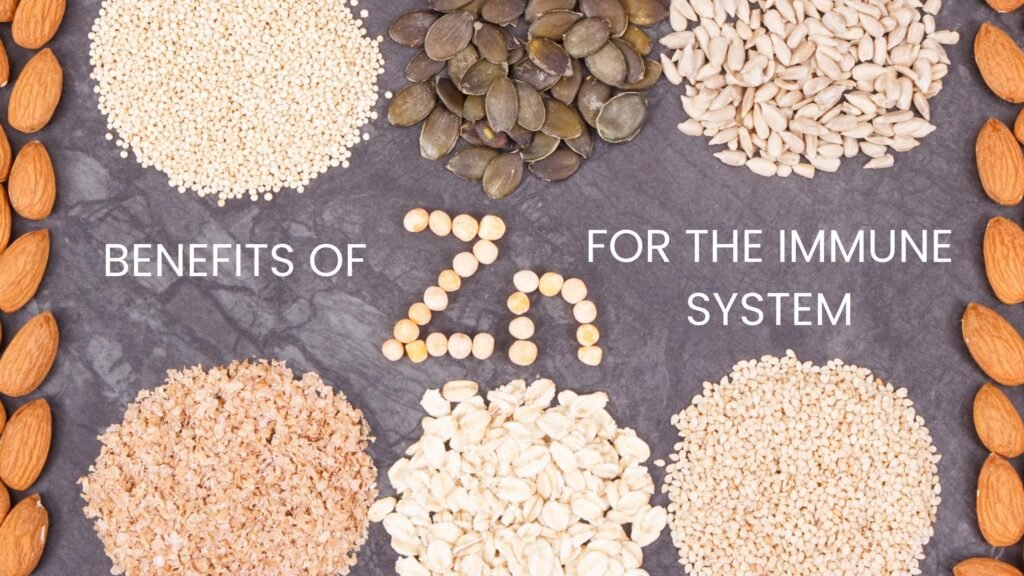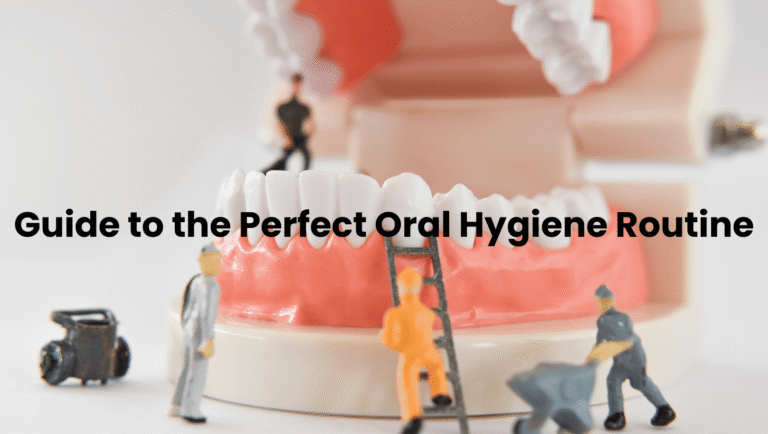Introduction
Zinc is an essential mineral that plays a vital role in various bodily functions, particularly in maintaining a strong and healthy immune system. While it is required in small amounts, its impact on overall health is significant. Zinc is involved in cell growth, wound healing, and even supporting metabolism, making it a key nutrient for overall well-being.
When considering zinc supplements, it is important to understand the concept of elemental zinc, which refers to the actual amount of zinc available for absorption and use by the body, as opposed to the total weight of the compounds in the supplement.
One of zinc’s most important functions is its ability to strengthen the immune system. It helps immune cells function properly, supports the body’s ability to fight infections, and can even reduce the severity and duration of colds and flu. As a natural antioxidant, zinc also helps reduce inflammation and promotes faster recovery from illness.
In this article, we will explore seven key benefits of zinc for the immune system, highlighting how this powerful mineral supports overall health and well-being. Whether through food sources like meat, seafood, and seeds or through supplements, ensuring adequate zinc intake can significantly boost your immune defenses and keep you feeling your best.
What is Zinc?
Zinc is an essential mineral that the body needs for various biological processes, including immune function, cell growth, and wound healing. It is classified as a trace element, meaning the body requires it in small amounts, yet it plays a significant role in overall health.
Dietary sources of zinc include both plant-based and animal-based foods. Rich sources include meat, poultry, shellfish (such as oysters), dairy products, nuts, seeds (like pumpkin and sesame seeds), whole grains, and legumes. Certain foods and preparation methods can affect zinc absorption, with vegetarian and vegan diets potentially leading to lower zinc bioavailability due to phytates in plant foods. For individuals who may not get enough zinc through diet alone, supplements are available in the form of tablets, capsules, and lozenges.
Why is zinc important? Since the body does not store zinc, it is necessary to get an adequate daily intake. Zinc is crucial for enzyme function, protein synthesis, and DNA formation. It also supports immune cell activity, reduces inflammation, and helps the body heal wounds more effectively. Zinc acetate is one of the forms of zinc supplements, used specifically for treating conditions like diarrhea in children and alleviating cold symptoms. Without sufficient zinc, the body may be more vulnerable to infections, weakened immune responses, and slower recovery from illnesses.
Benefits of Zinc for the Immune System

1. Strengthens the Immune System
How zinc helps immune cells function properly: Zinc plays a vital role in the development and function of immune cells, such as T-cells and white blood cells, which help the body fight infections. Maintaining adequate serum zinc levels is crucial for the proper function of these immune cells, as it influences their bioavailability and effectiveness. It regulates immune responses and helps activate immune cells to combat harmful pathogens.
Role in fighting infections and reducing illness duration: Zinc has been shown to help reduce the severity and duration of common illnesses like colds and flu. It can limit the replication of viruses, helping the body recover faster. Studies suggest that taking zinc supplements at the first sign of a cold may shorten its duration and lessen symptoms. Additionally, zinc supports the body’s ability to heal wounds and fight bacterial infections, further strengthening the immune system.
2. Helps with Wound Healing
Zinc’s role in tissue repair and recovery: Zinc is essential for cell growth and division, making it a crucial mineral for wound healing. It helps repair damaged tissues, supports the production of collagen, and promotes faster recovery from injuries. Oral zinc supplements can also be beneficial in promoting wound healing and managing chronic ulcers.
Importance for healing cuts, burns, and skin conditions: Zinc plays a key role in reducing inflammation and fighting bacteria, which helps prevent infections in wounds. It is commonly used in creams and ointments to treat cuts, burns, and skin irritations like acne and eczema. A sufficient intake of zinc ensures the body can heal effectively and maintain healthy skin.
3. Acts as an Antioxidant
Zinc’s ability to neutralize free radicals: Zinc is a powerful antioxidant that helps protect cells from damage caused by free radicals. These unstable molecules can lead to oxidative stress, which is linked to chronic diseases and premature aging. By stabilizing free radicals, zinc helps maintain cellular health and overall well-being.
How it helps reduce inflammation and oxidative stress: Chronic inflammation can weaken the immune system and increase the risk of various illnesses. Zinc plays a crucial role in reducing inflammation by regulating the immune response and supporting the body’s natural defense mechanisms. Its antioxidant properties also help lower oxidative stress, which contributes to a healthier immune system and overall improved health.
4. Supports Respiratory Health
How zinc may help reduce the severity of colds and flu: Zinc is well known for its ability to shorten the duration of colds and flu. It helps prevent viruses from multiplying in the body, reducing the severity of symptoms and speeding up recovery. Many people take zinc supplements or lozenges at the first sign of a cold to boost their immune response.
Role in managing respiratory infections: Zinc plays a key role in supporting lung function and reducing inflammation in the respiratory system. It may help protect against infections like pneumonia and bronchitis by strengthening the body’s ability to fight off harmful pathogens. Regular zinc intake can contribute to better respiratory health, especially during cold and flu season.
5. Promotes Healthy Gut Function
Zinc’s impact on gut bacteria and digestion: Zinc plays a crucial role in maintaining a balanced gut microbiome by supporting the growth of beneficial bacteria. A healthy gut is essential for proper digestion and nutrient absorption, helping the body function at its best. Zinc also aids in reducing gut inflammation, which can help prevent digestive issues such as leaky gut syndrome and irritable bowel syndrome (IBS).
Importance of a healthy gut for strong immunity: Since a significant portion of the immune system resides in the gut, maintaining gut health is key to overall immunity. Zinc strengthens the intestinal barrier, preventing harmful pathogens from entering the bloodstream. By promoting gut health, zinc indirectly enhances the body’s ability to fight infections, making it an essential nutrient for long-term immune support. Additionally, zinc oxide is used topically to treat skin conditions like diaper rash and is significant in dietary supplements for its absorption rates and efficacy, contributing to overall health.
6. Boosts Recovery from Illness
How zinc helps the body recover faster from infections: Zinc plays a vital role in immune cell function, helping the body respond quickly to infections. It supports the production of white blood cells, which are essential for fighting off viruses and bacteria. Zinc also aids in reducing the severity of symptoms, allowing the body to recover faster. Additionally, supplemental zinc can enhance growth and reduce health risks in children with specific conditions, such as sickle cell disease and pneumonia, by improving growth metrics and decreasing vulnerability to infections and hospitalizations.
Role in reducing symptoms of colds and viral infections: Studies have shown that taking zinc at the onset of a cold can shorten its duration and lessen symptoms like congestion, sore throat, and fatigue. Zinc lozenges or supplements are often recommended to support the immune system during illness, helping the body bounce back more quickly.
7. Regulates Inflammation
How zinc helps control immune responses: Zinc plays a crucial role in modulating the immune system, ensuring that it responds appropriately to threats without overreacting. It helps regulate inflammatory responses, preventing excessive immune activity that can damage healthy tissues.
Its role in preventing chronic inflammation and autoimmune issues: Chronic inflammation is linked to various health conditions, including autoimmune diseases and metabolic disorders. Zinc’s anti-inflammatory properties help reduce the risk of prolonged inflammation, protecting the body from issues like arthritis, digestive disorders, and immune system imbalances. By maintaining a balanced immune response, zinc contributes to overall well-being and long-term health.
8. May Improve Autoimmune Disorders
Zinc plays a crucial role in immune function, and research suggests that it may also have a positive impact on autoimmune disorders. Autoimmune disorders occur when the immune system mistakenly attacks healthy cells and tissues, leading to conditions such as rheumatoid arthritis, lupus, and multiple sclerosis.
Studies have shown that zinc supplementation may help to reduce inflammation and modulate the immune response in individuals with autoimmune disorders. For example, a study published in the Journal of Nutrition found that zinc supplementation reduced inflammation and improved symptoms in patients with rheumatoid arthritis.
Additionally, zinc has been shown to have immunomodulatory effects, meaning that it can help to regulate the immune response and prevent excessive inflammation. This is particularly important in autoimmune disorders, where the immune system is overactive and causes damage to healthy tissues.
Overall, while more research is needed to fully understand the relationship between zinc and autoimmune disorders, the available evidence suggests that zinc supplementation may be a useful adjunct therapy for individuals with these conditions.
How to Get Enough Zinc Supplements
Best food sources of zinc: Zinc is naturally found in a variety of foods, making it easy to incorporate into a balanced diet. Some of the best sources include:
Animal-based sources: Red meat, poultry, seafood (especially oysters, crab, and shrimp), and dairy products.
Plant-based sources: Nuts (cashews, almonds), seeds (pumpkin, hemp, sesame), legumes (chickpeas, lentils, beans), and whole grains.
Zinc supplements: types, dosage, and safety considerations: For those who struggle to get enough zinc through diet alone, supplements can be a helpful alternative. Common forms of zinc supplements include zinc gluconate, zinc citrate, and zinc picolinate, with varying absorption rates. It is crucial to understand the amount of elemental zinc in supplements, as this determines the actual zinc content and its effectiveness. The recommended daily intake for adults is around 8 mg for women and 11 mg for men. However, excessive zinc intake (above 40 mg per day) may lead to side effects such as nausea, stomach cramps, and weakened immune function, so it’s important to follow dosage guidelines and consult a healthcare professional before starting a supplement regimen.
Zinc Supplements and Immune Function
Zinc supplements are often used to support immune function, and research suggests that they may be effective in reducing the severity and duration of illnesses such as the common cold. Zinc lozenges, in particular, have been shown to be effective in reducing the duration of colds and flu.
When choosing a zinc supplement, it’s essential to consider the form of zinc used. Zinc gluconate, zinc sulfate, and zinc citrate are all commonly used forms of zinc, and each has its own advantages and disadvantages. For example, zinc gluconate is highly bioavailable and may be more effective than other forms of zinc in supporting immune function.
It’s also important to consider the amount of zinc in the supplement. The recommended daily intake of zinc varies by age and sex, but most adults need around 11-12 mg per day. Taking too much zinc can cause adverse effects such as nausea, vomiting, and diarrhea, so it’s essential to follow the recommended dosage.
In addition to supporting immune function, zinc supplements may also have other health benefits. For example, zinc has been shown to have anti-inflammatory effects and may help to reduce the risk of age-related macular degeneration.
Overall, zinc supplements can be a useful addition to a healthy diet and lifestyle, particularly for individuals who are at risk of zinc deficiency or have compromised immune function. However, it’s essential to choose a high-quality supplement and follow the recommended dosage to minimize the risk of adverse effects.
How Does Zinc Deficiency Affect the Immune System?
Zinc plays a crucial role in maintaining a strong immune system, and a deficiency can weaken the body’s ability to fight infections and stay healthy. Here’s how zinc deficiency impacts immunity:
Weakens Immune Response: Zinc is essential for the proper function of immune cells like T-cells and white blood cells. A deficiency can lead to a weaker immune response, making the body more susceptible to infections.
Increases Risk of Infections: People with low zinc levels are more prone to colds, flu, and respiratory infections due to a reduced ability to fight off viruses and bacteria.
Delays Wound Healing: Zinc is involved in cell regeneration and tissue repair. Without enough zinc, wounds take longer to heal, increasing the risk of infections.
Causes Chronic Inflammation: Zinc helps regulate inflammation in the body. A deficiency can lead to excessive inflammatory responses, which are linked to autoimmune diseases and long-term health issues.
Reduces Antioxidant Protection: Zinc acts as an antioxidant, helping to neutralize free radicals and reduce oxidative stress. A deficiency can lead to increased cell damage and a weakened defense against illness.
Ensuring adequate zinc intake through diet or supplements is essential for maintaining a healthy immune system and overall well-being.
Precautions and Interactions of Zinc
While zinc is essential for immune function and overall health, it is important to take it in the right amounts and be aware of potential interactions. Here are some precautions and considerations to keep in mind:
Avoid Excessive Intake: High doses of zinc (above 40 mg per day for adults) can cause nausea, stomach cramps, and headaches. Long-term overconsumption may lead to copper deficiency and weakened immunity.
Best Absorbed on an Empty Stomach: Zinc supplements are often best taken on an empty stomach. However, if they cause nausea, taking them with food can help reduce discomfort.
Use Caution with Pre-existing Conditions: People with conditions like kidney disease, digestive disorders, or autoimmune diseases should consult a doctor before taking zinc supplements.
Not a Replacement for Medical Treatment: While zinc can support immune health, it should not replace prescribed treatments for infections or other illnesses.
Drug and Nutrient Interactions:
Reduces Absorption of Copper: High doses of zinc can interfere with copper absorption, potentially leading to a deficiency. Consider balancing zinc intake with copper if supplementing long-term.
Affects Iron and Calcium Absorption: Excess zinc may interfere with the absorption of iron and calcium, so it’s best to space out supplement intake if consuming all three.
Interacts with Antibiotics: Zinc supplements can reduce the effectiveness of certain antibiotics like tetracyclines and fluoroquinolones. Take them a few hours apart.
Can Affect Diuretics and Blood Pressure Medications: Some diuretics (like thiazide diuretics) may cause excessive loss of zinc through urine, increasing the risk of deficiency.
Safe Supplementation Tips:
Stick to the recommended daily intake (8 mg for women, 11 mg for men).
Choose zinc-rich foods like meat, seafood, nuts, and legumes before relying on supplements.
If supplementing, consider taking it with food to minimize stomach irritation.
Always consult a healthcare provider before taking zinc supplements if you are on medication or have a health condition.
By following these precautions, you can safely benefit from zinc while avoiding potential risks and interactions.
Conclusion
Zinc plays a vital role in maintaining a strong immune system and overall health. From supporting immune cell function and promoting faster recovery from illnesses to reducing inflammation and enhancing gut health, zinc is an essential mineral that should not be overlooked. Its antioxidant properties, role in wound healing, and ability to help regulate immune responses further highlight its importance.
Incorporating zinc into your diet can help you stay healthy and resilient against infections. Whether through nutrient-rich foods like meat, seafood, nuts, and legumes or high-quality supplements, ensuring you get enough zinc is a simple yet powerful step toward better immunity.
Start boosting your immune system today—explore zinc-rich foods or supplements and experience the benefits of this essential mineral for yourself!




